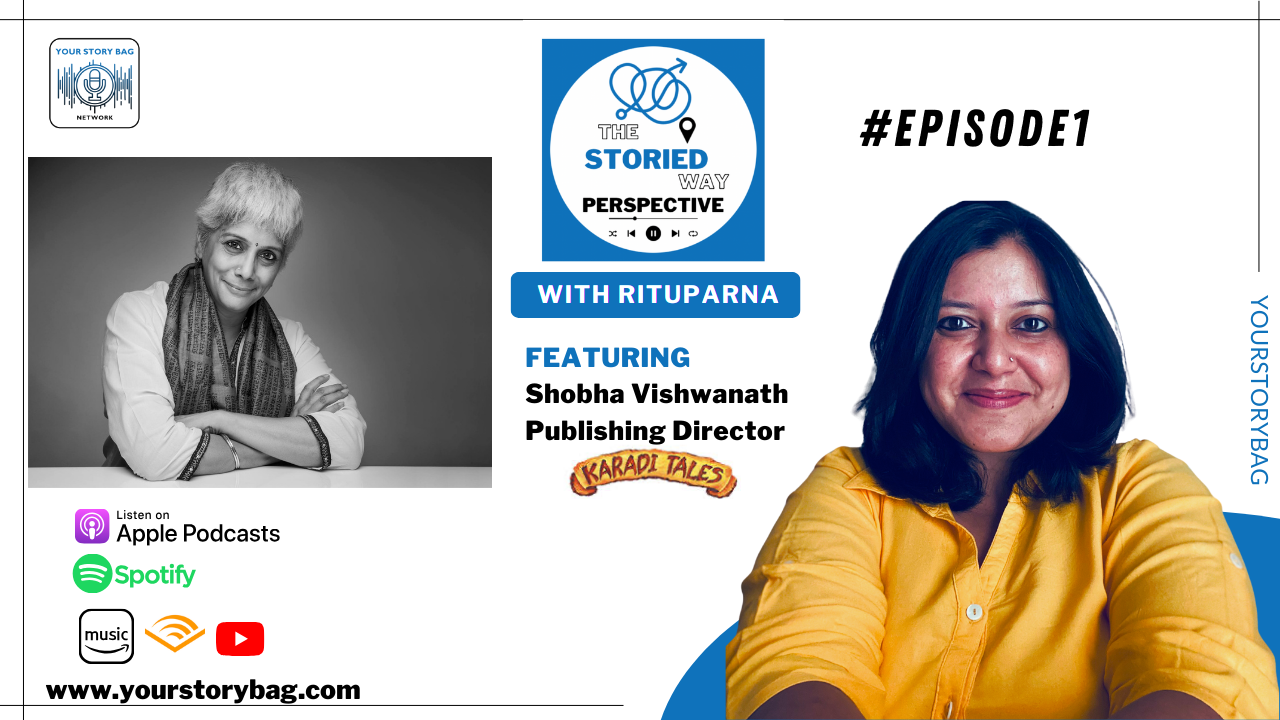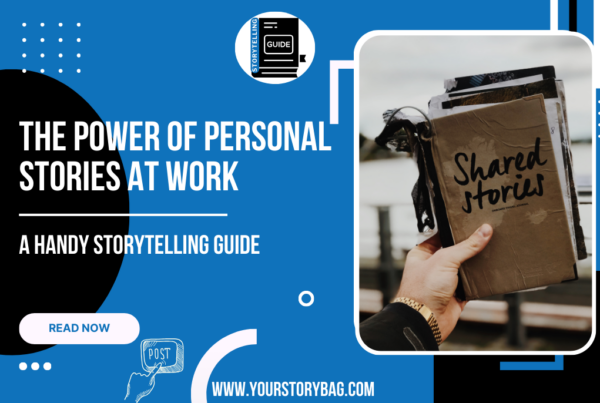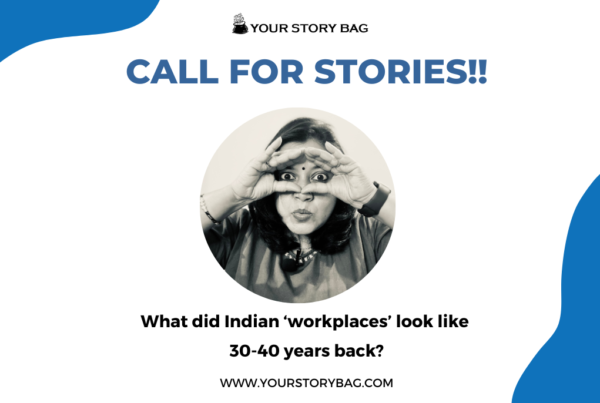
The Storied Way Perspective with Rituparna is a bi-monthly podcast where you will meet storytellers, influencers, entrepreneurs, coaches, thought-leaders & experts as I ask them what can stories do in the world today?
This blog is a continuation of our conversation with Shobha Vishwanath, Publishing Director, Karadi Tales. Links to books mentioned in the podcast are mentioned. The blog also contains the links to the episode across podcasting platforms.
Please remember to Rate, Review, Share, Like, Comment the podcast. This helps it being discovered!
You can write to us at Podcast@yourstorybag.com
Rituparna
How did Sky Music India Private Limited become Karadi Tales?
Shobha
We started our first set of stories as retellings of existing folk tales or from the Panchtantra or the Jataka. And when I was reading through all these stories, trying to choose the ones that I could retell, I didn’t find any stories with a bear in it, you know, and it’s kind of surprising because it’s the bear unlike a zebra or a giraffe is a part of the Indian forestry you know that why still aren’t there enough stories about the bear. There are about jackals and there are about crows and definitely many kinds of birds and elephants but very very few in fact none I would put the question back to you and ask you do you know any bear stories which form a part of the Indian folklore. They weren’t any. There’s one something about friendship. Two guys go out into the forest and the bear is not a good guy and it’s not about the bear. It’s about the friendship. Yeah. So I thought let me make the bear the sutradhar of all the stories. And then I didn’t want to call Baloo like in the jungle book or Bhaloo because there were enough words from the north that the south had adopted but very few words that had migrated from here to the north other than food words like idli or sambhar or dosa. So I decided to also of the four southern states three of them had the same name for the bear which was Karedi and so Karadi became the sutradhar. Karadi just came to stay and then in just a couple of years Karadi Tales became far better known than Sky Music India Private Limited and so we just changed the name of the company from Sky Music to Karadi Tales.
Rituparna –
Besides Naseeruddin Shah & Saeed Jaffrey you had other legendary actors telling stories with you. Tell us about them.
Shobha
Saeed Jaffrey after that then there was Girish Karnad who did all our mythology stories and then there was Tom Alter who did some of the Hindi stories. There was Gulzar Sahib who initially we went to to translate our English stories because Nasir said that only if Gulzar Sahib translates the stories will I do them in Hindi. And so we went to Gulzar Sahib and Gulzar Sahib translated all the stories and he said, but why would you not consider me? And so we went back to Gulzar to give voice to the stories. And then we did a whole series which was called Will You Read With Me? where we used a more contemporary, what you call actors like Sanjay Dutt and Vidya Balan and Konkanas and Sohali Khan and we used Sanjay Dutt and Vidya Balan
Rituparna –
You also did one with Rahul Dravid.
Shobha
We did one with Rahul Dravid as well. Yeah, we did two stories with Rahul Dravid. And he was just so marvelous, know, just so fabulous. So this is what happened to it. We did stories with Nandita Das, we did with Shekhar Kapoor, and we did with Boman Irani. So there was this huge, lovely, wonderful cast, many, many of them who came from theater and therefore we built
I don’t know the series of audiobooks which were remembered for several things for great storytelling primarily, you know.
Rituparna –
What’s your vision for the S.T.O.R.I Series?
Shobha
So we came up with five books. Now we’ve got five other books. There are 10 books in the series. And my aim for this, I don’t think that if I set it in a bookstore next to a wimpy kid or a Percy Jackson, anybody is going to pick up, you know, no nonsense, Nandini, or no ticket will travel. So our aim with the books is to just introduce them to schools.
classes, schools use them as supplementary readers and not necessarily for English because they would be a supplementary reader for environmental science or for geography or for, I don’t know, climate change. So many things, know, English too, but even history for that matter, you know, so. Right. Or economics, right?
Rituparna
That’s what I did with the book I took the school. I made the kids draw. said, imagine you are driving. How many of you have been on a train? And which was the last time. And that’s where the bike whole journey started. So if you look out of the window, whether you’re driving by, you’re going in a train or your car or you’re on a bus, just look out of your window. What do you see? You will see fields. Thank God they see fields. So I said, OK, now what do you see in the fields? Can you draw a scene from inside a window?
So they draw the field and then we went to the farmer and they went, most of them drew men as farmers. And that’s where the whole exploration started. said, who do you, why do you think that most men farm hands are men? And we spoke about statistics about the number of women who are on the farm and why are them, where are the men then? And all kinds of things. And then I brought them to Nandini’s story. And when I told them that this could be well, the story of the woman who’s sitting outside your house and selling you vegetables.
Shobha
Wow! And how much time have you taken in speaking to the maid who cleans your house? Or the driver who drives your car? Where do children engage in conversations with them? Adults seldom do or very… they dive into it a little bit. But children hardly ever do. They are are taken for granted and their people who are there with a certain sort of entitlement you look at them and this is very problematic you know. We just are converting all of these into audiobooks as well. So when I was recording one of them recently, it’s a book called Lost in Translation. And it is, I mean, we don’t even know the numbers of languages that are spoken across the country. If you have been lucky to have spent your childhood in a place like Bombay, for instance, then you have at least in your years have fallen various languages.You could be in an apartment, your neighbor could be speaking Tulu or Kannada or Marathi or Gujarati or Bengali or whatever. But if you lived your life in a place like a second -tier city in Tamil Nadu, maybe a Coimbatore or something, where in the world are you even going to have an idea of what these languages are? And this talks about, Lost in Translation talks about a migrant family that moves from Rajasthan, you know or Bihar, I’m not sure, to Chennai because it’s during the pandemic that they have to, they’ve lost their jobs, they’ve lost their farmland and they have to move in search of work and somebody in the family has found the father a work in construction in a place in Chennai and the entire family moves and now this child who is a topper in his class in his city now has to go to a government school in and has to deal with Tamil as the medium of education you know and and from there just as he’s getting the hang of it and is able to get his act together the family moves again to Bangalore and now the child has to learn Kannada. And from there they moved to Surat to learn Gujarati. And this intelligent, wonderful child has such a blow to his self -esteem because in every school that he goes to, he’s not able to perform because language is such a barrier. And I was recording the story. One, of course, is for me when I presented it in a forum to a group school heads and somebody said yeah yeah I can relate to it because my father was in the army I said I said they are two different things there’s two completely different things you’re not fighting for your livelihood here you’re fighting for your livelihood you are going to a government school you you went to Kendriya Vidyalaya probably you know if you were moved across in the army.
Rituparna
Tell me more about your Picture Book Writing Workshop. I haven’t seen any other publisher help new writers step into writing for children.
Shobha
Like I said, initially we started with sensitising people about picture books. Recently, I went to Surat and addressed a bunch of librarians on what a picture book was and they said, my God, we never looked at the picture book like that, that we sort of flip through the pictures. But I’m saying that the pictures are the ones that are telling so much of the story. So one is to sensitize people or to make them aware of really what a picture book is and how a picture book should be seen, read, enjoyed and then only you come to the business of writing because you have to know that format first, you have to understand it. Lots of people are buying picture books and of course it’s less so than before where people always liked in India omnibuses or compendiums, know, seven, eight stories together and with a drawing here and there and they would say, why would I pay? So much money for a single picture book when I’m getting so many stories in a single book. Because again, it’s not judgmental. This whole genre of the picture book itself is relatively new to India. We are fundamentally oral storytellers. Our storytelling began that way under the Banyan tree, under the Peepal tree or under the Tamarind tree. Our telling had song and dance and expressions and movement and all of that. Now you’re taking that big thing and reducing it to a picture book. And I would say reducing in a nice way because now the storyteller under the banyan tree has long gone, you know, and where are the banyan trees, first of all, and there’s the space to sit under the banyan tree.
Rituparna Ghosh
My next question is as fellow entrepreneur. You’re 28 years old, I’m 10 years old as an entrepreneur in the world of storytelling in India. If you were to sort of give advice from an entrepreneur to entrepreneur, as long as talking about storytelling and children are concerned, what would your suggestions be to me? Because like you, even we work with stories and a sort of storytellers who I mentor and I train, they work with children, they want to tell stories to children, but the gatekeepers are their parents, their teachers, the librarians. Lots of adults in their lives who they have to satisfy first. And whether it’s the value of a book or the value of a service, somewhere the purpose gets diluted because they have to cater to so many people. And they start wondering, is my storytelling making sense at all or not? So while the landscape has changed and like you said 28 years back, you started with an innovation which nobody else was doing and then from there you are here where you
Similarly, a lot of storytellers are also figuring out, how do I keep telling stories to children and still move the envelope as far as the craft is concerned? And like you said, the trees are not there, but there are some storytellers who still looking for those trees to stand under and tell. But the question is, would people look up from their phones and step out of their homes to sit under a tree and listen to a story? So what would your advice be?
Shobha
So two things here Ritu, one is the bit about being an entrepreneur. With entrepreneurship, immediately is associated money. Okay. Now I may be here for 28 years and if I was to rethink my career, would I be doing something else? No, I would still do publishing and I would still be in this space, but there is no money for the in children’s publishing in children’s storytelling, independent children’s storytelling and children’s publishing. There is no money. This is across the globe. Anybody will tell you that, you know, an imprint survives because there is the parent company to. But should you take the children’s imprints out of these larger publishing houses, they would not be able to stand on their own. It requires the support of that. So if you’re in this to make a lot of money, then one must rethink it. But if you’re in it for truly out of passion and because you’ll the joy of it and the love of it, which clearly you are, then then your dreams have to be other dreams, not about building Bangla and getting out the Mercedes.
Other Books mentioned in the Podcast | Thukpa for All | A Pair of Twins | The Boy who Wore Bangles
Thank you for reading!
Have you heard the podcast?






